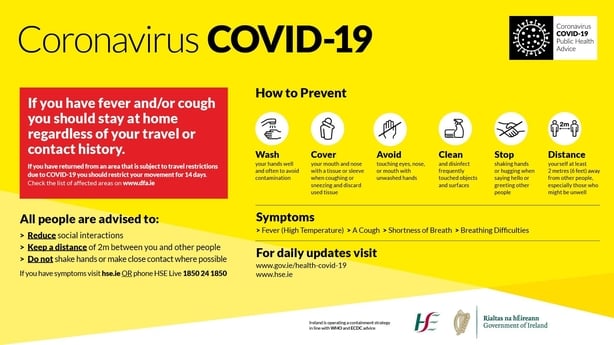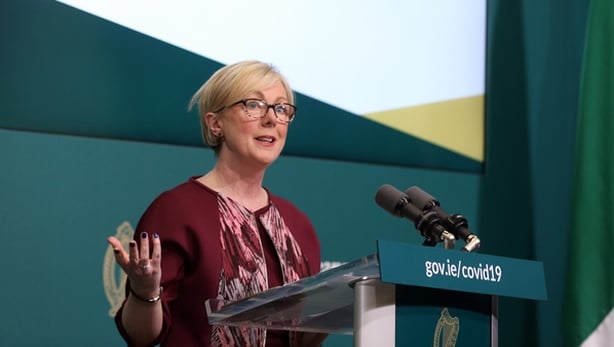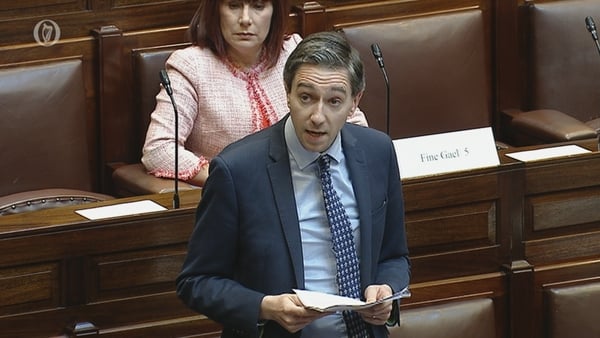A woman from the east of the country who was diagnosed with Covid-19 has died, the Department of Health has said.
Speaking at a press briefing, Chief Medical Officer Dr Tony Holohan said it had not been reported to the department that there had been an underlying condition related to this particular case.
She is the third person to die from the virus in Ireland.
There have also been 191 new cases of Covid-19 confirmed in Ireland, bringing the total in the country to 557 from 366 yesterday, which is an increase of 52%.
The amount of Covid-19 testing has increased after the National Public Health Emergency Team changed the thresholds for testing last Friday.
Cases have been confirmed in every county apart from Monaghan, according to the department's figures.
Dr Holohan said the department would not have expected to see any impact from social distancing measures on the figures at this point.
He said officials anticipate social distancing will flatten growth, but added that we are likely to continue to see growth in cases.Dr Holohan said a "youngish cohort" of people were being diagnosed with the virus, saying he wanted to get the message across of the risk they represent to older people.
Earlier, Northern Ireland recorded the first death of a patient with Covid-19 there.
Stormont's Department of Health said the patient, who died in hospital in the Greater Belfast area, was elderly and had an underlying health condition.
A total of 77 people have tested positive for Covid-19 in Northern Ireland, up nine from yesterday.
Overall, there are 634 confirmed cases of Covid-19 and four deaths on the island of Ireland.
Around 80% of cases of Covid-19 will be a mild to moderate illness, close to 14% have severe disease and around 6% are critical.
Generally, you need to be 15 minutes or more in the vicinity of an infected person, within 1-2 metres, to be considered at risk or a close contact.
We need your consent to load this rte-player contentWe use rte-player to manage extra content that can set cookies on your device and collect data about your activity. Please review their details and accept them to load the content.Manage Preferences
Read more:
Recap: Coronavirus pandemic
The Health Protection Surveillance Centre has said that as of midnight on Tuesday 17 March there were 350 reported cases.
Of these, 55% were male and 43% were female, with 26 clusters. The median age of confirmed cases is 43 years old.
It said 31% of cases have been hospitalised, with 2% (seven cases) admitted to Intensive Care Units.
There are 84 cases associated with healthcare workers, 28 of whom are associated with foreign travel.
Dublin has the highest number of cases at 172, followed by Cork (62) and Limerick (14).
Community transmission accounts for 35% of cases, local transmission/close contact accounts for 21% and travel abroad accounts for 43%.
The HPSC said 71 of the 350 cases up to midnight on Tuesday remain under investigation.
Speaking on RTÉ's Primetime tonight, Professor Sam McConkey, Head of the Department of International Health and Tropical Medicine at RCSI said that the current figures on cases of Covid-19 suggested that we might see up to 2,000 cases a day in ten days time.
Professor McConkey said it was hoped was that social distancing, contact tracing and self isolation will change that.
Professor McConkey said that "if we don't see some change and some improvement in the next five and seven days then we probably do need to do things differently" in terms of social distance enforcement.
Speaking on the same programme the Director of National Virus Reference Laboratory said he was disappointed but not surprised that 191 new cases of Covid-19 were announced today
Dr Cillian De Gascun said we had not yet seen the impact of the social distancing measures announced this day last week.
Asked when he expected to see results from those measures, Dr De Gascun said that they had set the date of 29 March at the outset.
"We really want to see what impact of those measures will be by next weekend," he added.
Cillian De Gascun discusses whether the increase in Covid 19 cases in Ireland today are due to increased testing or an increase in the virus among the population #RTEPT | #COVID19 | #coronavirus | @MiriamOCal | @CillianDeGascun pic.twitter.com/juHHksGPqj
— RTÉ Prime Time (@RTE_PrimeTime) March 19, 2020

Northern Ireland's Health Minister Robin Swann said the death rate in Northern Ireland could reach as high as 15,000 in a "worst case nightmare scenario".
"If we fail as a community to take the necessary action to slow down the transmission of the virus, up to 80% of the Northern Ireland population could be infected during this pandemic," he said.
"If all the public health advice is ignored, in a worst case nightmare scenario and with a fatality rate of 1%, then that could mean up to 14,000-15,000 lives lost."
The legislation is expected to be brought before the Dáil next week.
Minister for Housing Eoghan Murphy, who announced the measures today, said they were necessary measures to help renters.
The Minister for Social Protection has acknowledged that as many as 400,000 people could lose their jobs here as a result of the Covid-19 outbreak.
Regina Doherty said last week the first industry her department had looked at was hospitality, where 140,000 are employed.

But she said a further 54,000 people work in accommodation and 200,000 in retail and these are just the obvious industries that will be impacted.
The Government has also outlined measures in relation to school State exams.
Assessments in Leaving Certificate Oral Irish and modern European language have been cancelled.
Practical tests in the Leaving Cert and Junior Cycle, which were due to begin next Monday, were also cancelled.
Minister for Education and Skills Joe McHugh said that all students due to sit these elements of the exams would instead receive the full 100% mark.
He also said the deadline for the completion of other project work was being extended to 15 May.
Minister for Health Simon Harris told the Dáil that the political leadership not only has a responsibility to lead the response to coronavirus outbreak, but also to respond to the individual and national anxiety that exists in Ireland.
He was speaking at the opening of a debate on emergency legislation to provide financial supports and additional government powers to respond to the virus.
The 'Health Preservation and other Emergency Measures Bill' is expected to pass all stages in the Oireachtas this week.

